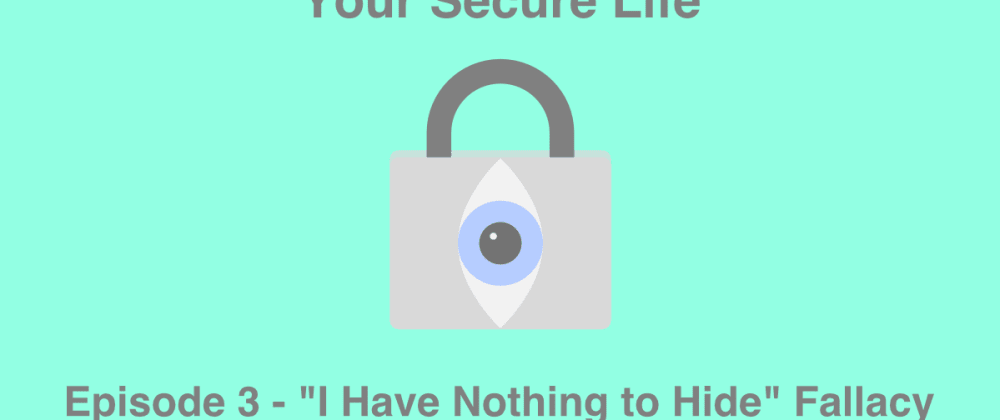Episode 3 of the Your Secure Life podcast.
Watch the Episode
Listen to the Episode
Website | Apple/iTunes | Spotify | Google
Read the Transcript
Hey, welcome to the Your Secure Life podcast. This is episode 3.
Today, we're going to be talking about something that I hear a lot.
Last week, we talked about something else that I hear a lot, which is "no one's going to come after me. No one wants to hack me. Why should I worry?"
And so this week we're actually talking about something else I hear a lot, which is "I don't need privacy because I have nothing to hide."
So if you have nothing to hide, that's cool. I get it.
Why don't you just go ahead you can go to YourSecure.Life/contact. There's a form you can fill out. Go ahead and send me your Social Security number, first, middle, last name, your address, the log in to your bank account, and you know, you got nothing to hide so you don't need that privacy.
You can just send it to me, right?
That's what I thought.
Anyway podcast over. That's really that that seals the deal right?
I'm just kidding. Of course I have more to say.
If you're one of those people who thinks that you don't need privacy because you have nothing to hide, then I want you to listen extra close to this episode.
And if you're one of those people who knows how important privacy is then please forward this on to everybody that you hear that tells you that they don't need privacy because they have nothing to hide.
I know that anybody who's listening to this knows someone who said that to them before. We've all heard it and it's such crap.
The Government is Not Your Friend
First things first. The government is not your friend.
This isn't any sort of political stance. I'm not going to get into Politics on this podcast, but the fact is the government is not your friend.
The government has a job to do and they're going to do the job.
Whether they do it well or not is up for debate. And again, we're not talking about politics on this podcast. So, go find another podcast if that's what you want to talk about.
It's okay to like your government and your government might even like you too.
That's totally fine. But they're not your friend. They're here to do a job.
The government has goals. It has procedures. It has things that it wants to do and you probably have nothing to do with any of that and they will do what they need to do to achieve those goals and to complete those tasks.
Your government does not care about your privacy. They don't care about your feeling comfortable. They don't care about your feelings. They don't care, as long as they're doing what they think is best.
Whether you like your government or not, you have to prepare for the future. Just like car insurance or renters insurance or signing a prenup before you get married.
You don't want to have to use these things. But if you do, they're there.
And that's the importance of getting started on privacy now.
There is a possible future where your government is no longer on your side and you need to be prepared for that.
Hopefully that never happens and your best interest is always the government's best interest, but you have to prepare in case something bad happens and that's why you need privacy right now.
If you feel like your government is on your side right now, be thankful. Because right now, at the recording of this podcast, and probably any other time in history, there are people who do not feel that their government is on their side. And that could change at any moment for any of us.
We can't leave our privacy and our security up to the possibility of an evil government taking advantage of that and taking advantage of us.
Corporations are Not Your Friend
Another institution that's not your friend is corporations.
Just like governments, they have goals. They have tasks. They may keep you in their best interest. They may not.
What really bothers me, and what should really bother you, right now about corporations and our data is that you're not getting a piece of the pie.
They're collecting and selling your data. You are the product but you're not getting a piece of that pie.
You're underestimating the value of your own data.
And you might say, "well, you know Facebook provides me a good service and I'm satisfied with the service that they provide so I'm okay with trading my data to get that service and not have to pay for it."
And I understand that.
But you need to realize that the value you're getting is not equal.
If you were to take the idea of Facebook and say "how much would they charge for me to still use it?"
What is the cutoff?
What if they charged a dollar a month. Would you still use it?
How about $5, $15, $20 a month. Would you still use it?
If not, then that's how much you're valuing your data at. And they're making way more than that off of your data.
You deserve a piece of that pie.
Right now, data is the number one most valuable commodity in the world.
Because they're not giving us our share of the value in the data, we need to be using privacy software, privacy techniques, to keep that data away from them so that they can't profit off of us.
And we need to tell them, "hey, look, if you if you want this data, you need to give me the fair value for it."
When they want to start talking about it, then sure, let's talk about it again.
Until then we need to keep our data out of their hands.
All right, so moving on from corporations. Let's talk about something else.
Minimize the surfaces upon which you can be attacked.
There's this saying that I've heard before and it's "a door is a door unless it's a jar."
If you don't get it, I don't really know how to explain it to you. Just think about it for a little bit.
But we are going to talk about doors.
So let's do some visualizations.
Imagine everything that you love, all the people, all of your physical items, everything that you love is surrounded by a wall.
I picture a red brick wall. You can picture whatever kind of wall you want.
Actually now, I'm picturing a cement wall with barbed wire, kind of like a prison.
So maybe I should talk to my psychologist about that.
Anyway, just picture a wall, four walls actually, surrounding everything you love.
This is very safe. It's surrounded by walls. But it's not very practical.
You can't get to your stuff, or if you're in the room, you can't get out. So this isn't very practical.
We need to put a door, so we put a door in.
Now, we can get to everything we love but there's now a hole in the wall that can be breached.
Of course, we can put locks on it and we can get a really sturdy door and we can do all sorts of things to protect that one door. But it's still a door and it's still able to be breached.
That's a reality and that's a cost of life. We can't not have the door.
But then the government comes by and they say, "hey, we need our own door to get access and only we're going to have the key. We're not going to let anybody else through. It's just for us and it's to keep you safe."
So you say all right.
I mean that's fair, you know, that makes sense and nobody else is going to have the key anyway, so, you know, how big of a deal could it be?
But here's the thing. It's a second door. If robbers find it, maybe they can pick the lock or maybe they can get a copy of the key.
There's lots of things they can do to get through that door.
And now you have two doors and that means there's two attack vectors for robbers or anybody else to come in and get all of the things that you love and take them away from you.
This is why we can't have special back doors for governments or corporations or whoever.
Every time there's a back door, it's vulnerable, and it's not going to be 100% safe.
So we can't allow there to be any sort of backdoors.
If there's any sort of backdoor, even if it's for someone we trust, that back door can be exploited by someone we don't trust. And it can be used or hurt us later.
There are five things you need to protect first.
So let's talk about the minimum amount of privacy you should have.
There's basically five steps:
1. Hide your email address.
First, you should be able to obscure your email address.
2. Hide your phone number.
Then you should be able to obscure your phone number.
3. Hide your physical address.
You also need to obscure your physical address for a lot of situations.
4. Hide your passwords.
Due to all the data breaches out there, we hear about them like every day now, some big company has a new data breach and all of our passwords and emails and phone numbers are out there.
We need to have a different password for every website and we talked about that in episode 1.
That talks about password managers and why you need those and why you should have a different password for every website. So I'm not going to get into it here.
5. Clean up what's already out there.
But also all four of those things plus how to clean up what's already out there is all in a guide.
It's free. It's at YourSecure.Life/guide.
You can take it as a 5-day email course, where each day it tells you one thing to do.
Or you can download a PDF that gives you everything and you can pretty much knock the whole thing out on like a Saturday.
Aside from that while, you're at YourSecure.Life, you should check out our other episodes.
We've got an introduction episode. That's at YourSecure.Life/0.
Then the first episode's about password managers. I already mentioned that.
And the second episode is about why you would be targeted even if you're nobody. Especially if you're somebody.
This episode is episode number three, we're talking about why you need privacy whether you think you do or don't.
By the way, I don't remember who said this, some people say Edward Snowden said this, I don't know who said this but it rang true with me and that's "saying that you don't need a right to privacy because you have nothing to hide is like saying you don't need a right to free speech because you have nothing to say."
It just doesn't it doesn't work out that way. That's not how freedoms work. That's not how rights work.
So think about that while you're showering tonight or you know, whatever driving to work wherever you're listening to this, you know think just think about how important privacy actually is to you and your life even if you think it's not.
Closing remarks:
So this is going to wrap it up.
I already told you where to go: YourSecure.Life.
This podcast has no sponsors and that's on purpose, that is intentional.
I don't want sponsors because I hate commercials.
So the best thing you can do is look us up on Apple podcasts and give us a subscribe, a nice comment, maybe a good rating or if you hate us give us a bad rating. Whatever.
Leave us some feedback so that we can provide a better podcast for you.
Another thing you can do to help us out is tell anybody you know that could use this information.
This whole podcast, the point of this podcast isn't to make money.
It's to spread awareness and to spread the knowledge because security is herd immunity. The more of us that are secure the more secure we all are. And that's what's really important.
Thanks again, and I'll see you next week.
Sometimes stuff pulls the wool over our eyes and gets us. Sometimes our information gets out there other ways (like through breaches). We can minimize the damage with just a few actions. Get the free 5 step guide to clean up your digital footprint.







Oldest comments (0)